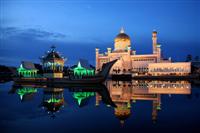Visit worldtravels.com for the full guide to Brunei. Build a complete Brunei travel guide and email to your clients - sign up for a trial subscription of World Travels Pro.
Brunei

Despite its modest size the sultanate of Brunei Darussalam is enormously wealthy in both natural resources and worthwhile attractions. Few people consider this tiny nation at the top of Borneo to be a destination in its own right but those that do are rewarded by the safest, most environmentally pristine country in Asia. The majority of visitors, however, experience Brunei either as a passenger en route elsewhere or a business traveller taking advantage of its burgeoning role as regional economic hub.
Brunei's culture is shaped by its Malay majority and deeply entrenched Islamic traditions, bound together by the sultanate's uninterrupted 600-year royal heritage. Citizens enjoy one of the world's highest standards of living with free healthcare, education and housing thanks to the largesse of the Sultan, who is the sole beneficiary of the country's oil reserves. In celebration of his 50th birthday he reportedly spent US$50 million; on another occasion he tipped hotel staff US$170,000.
Located on the north tip of the island of Borneo, the country is divided into two unconnected halves: 97% of the population live in the larger western half where the modern capital Bandar Seri Begawan (BSB) is located, while an estimated 15,000 people live in the predominantly rural and mountainous eastern half. Adventure travellers are draw to the natural splendour and adrenalin charged sporting activities of this region, most of which is virgin rainforest.
Visitors to BSB can enjoy architectural treasures such as the Sultan Omar Ali Saifuddien Mosque, the fascinating traditional water villages, and the Sultan's palace, Istana Nurul Iman - with 1,700 rooms, the world's largest palace still in use. BSB also has some worthwhile beaches, most notably Jerudon which has gorgeous white sands and a child-friendly amusement park to one side of it.
Climate
Brunei has a distinctly tropical climate with year-round hot weather and high humidity. The best time to visit is June to September. Uniquely for the region, Brunei has two monsoon seasons with heavy rainfall from October to February and from May to June. Rain showers tend to be heavy but short-lived. Over March and April rainfall drops to nil, and drought conditions characterise the coastal areas. Temperatures have been known to get up to 40°C making this an uncomfortable time to visit.
Money
The official currency is the Brunei Dollar (BND), divided into 100 cents. The Brunei Dollar is linked to the Singaporean Dollar which is accepted as legal tender throughout Brunei.
All major credit cards are accepted in larger hotels, restaurants and shops. Cash is best advised for smaller establishments and when transacting in remote areas. ATMs are widespread especially at major banks which are concentrated along Jalan Sultan in the capital.
To cash travellers cheques or change money use the major banks as they offer far better rates than hotels. Money can also be converted at the informal moneychangers that operate from booths at most transport hubs. If you choose to use this channel ensure you shop around for the best rate.
Passport Visa
Travellers must have all documents necessary for their next destination and return air tickets. Passports must be valid at least six months beyond period of stay if a visa is required.
Entry Requirements
- US passport holders require a valid passport, but a visa is not necessary for stays of up to 90 days.
- UK passport holders require a valid passport, but a visa is not necessary for stays of up to 30 days.
- Canadian passport holders require a valid passport, but a visa is not necessary for stays of up to 14 days.
- Australian passport holders require a valid passport, and a visa. Visas can be obtained on arrival for a stay of up to 30 days.
- South African passport holders require a valid passport and a visa obtained before departure.
- Irish nationals require a valid passport, but no visa is necessary for a stay of up to 30 days.
- New Zealand nationals require a valid passport, but no visa is necessary for a stay of up to 30 days.
Health
Health concerns will depend on whether or not you are traveling to the remote areas of the Sultanate. In Bandar Seri Begawan and the large towns the tap water is safe to drink, no vaccinations are required, and world-class medical facilities are available. However if you are exploring the remote wilderness you should take the precaution of hepatitis, typhoid and tetanus vaccinations and drink bottled water only. Dengue fever outbreaks and other mosquito-borne diseases are common. Take precautions against mosquito bites including using insect repellent at all times. Frequently there is a smoke haze across some parts of Brunei, typically from July to October, which may cause respiratory problems. You are strongly advised to take out comprehensive medical insurance that includes the option of emergency repatriation. Certain foreign governments advise you to exercise caution and keep abreast of developments that might affect your safety in Brunei as since 2001 there is a heightened risk of terrorist attack.
Embassy Consulates
- Brunei Embassy, Washington DC, United States: +1 202 237 1838
- Brunei Embassy, London, United Kingdom: +44 (0)20 7581 0521
- Brunei Embassy, Ottawa, Canada: +1 613 234 5656
- Brunei Embassy, Canberra, Australia: +61 (02) 6285 4500
Foreign Embassies
- United States Embassy, Brunei: +673 2 220 384
- British Embassy, Brunei: +673 2 222 231
- Canadian Embassy, Brunei: + 673 2 220 043
- Australian High Comission, Brunei: +673 2 229 435







